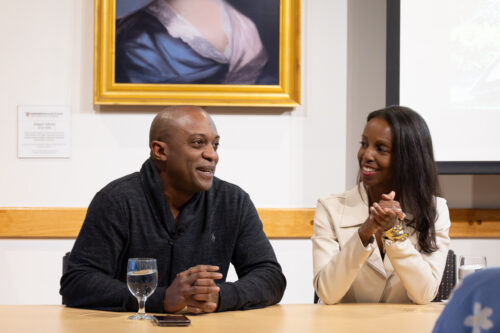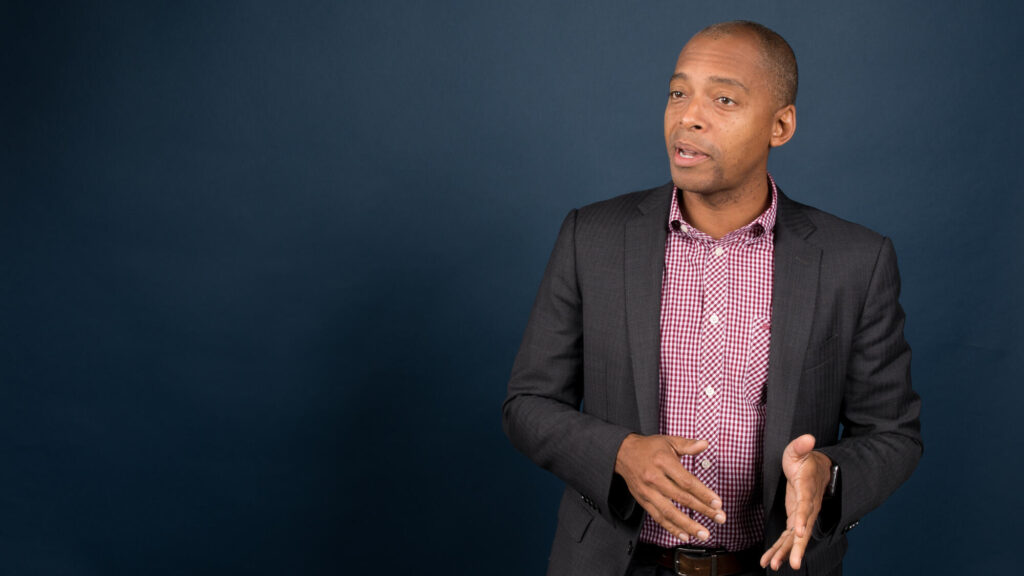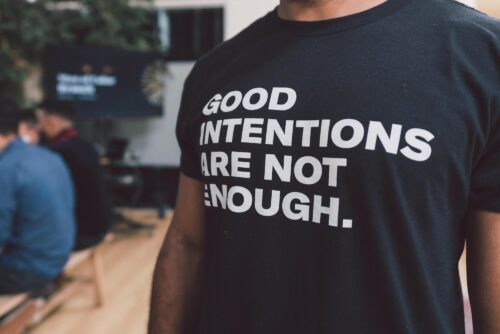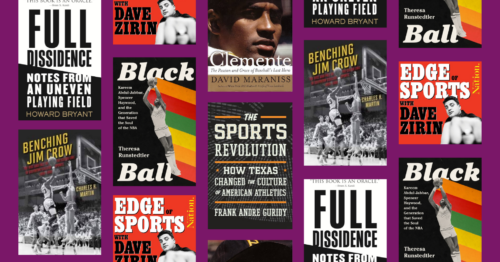
Video
Art Imitates Nation: A Conversation with Hank Willis Thomas
Artist Hank Willis Thomas spoke with Harvard professor Sarah Elizabeth Lewis about how love guides his artwork at a Harvard Kennedy School Institute of Politics forum.
Q+A
LaChaun Banks, Ash Center Director for Equity and Inclusion, sat down with Khalil Gibran Muhammad, Ford Foundation Professor of History, Race, and Public Policy at Harvard Kennedy School and Director of the Institutional Antiracism and Accountability (IARA) Project, housed at the Ash Center, to discuss leading organizations to antiracist change and accountability.
Originally published October 1, 2021 and updated December 8, 2021
Ash: What prompted you to launch the Institutional Antiracism and Accountability (IARA) Project? Specifically, what gaps did you see in the resources and research available within academia as well as private, public, and community organizations?
Khalil Gibran Muhammad: For IARA, our goal is to move organizations from words to action to accountability as it relates to policy, practice, and sustainable change. As the landscape of diversity efforts has widened, so too have the gaps between talk and actual change. Substantial antiracist change takes commitment, leadership, and accountability. IARA uses the history of failed diversity efforts as the basis for benchmarking current efforts and seeks to identify best practices that achieve long-term sustainable changes. Our research team reviews existing mechanisms to hold organizations accountable, then uses those findings to create our own set of industry standards for accountability. We focus across private, public, and nonprofit industries to identify lessons and promote intra- and inter-sectoral change.
From where we sit at Harvard University, and as a third party, we feel that IARA is uniquely positioned as an independent evaluator of organizational behavior. We’re able to look out at the field as a whole and synthesize the lessons learned from researchers, consultants, and organizational leaders themselves.
IARA is grounded in historical methods, both because I am a historian and because we see critical race scholarship as a fundamental underpinning for understanding our current reality. Looking across history, many firms have been unwilling to reckon with their histories of harm and abuse of communities of color—let alone adopt antiracism as a core value and institutional norm. Building on the United Nations Sustainable Development Goals, IARA centers accountability as the key driver of organizational change rather than good intentions and goodwill.

As organizations continue to increasingly invest in diversity, equity, and including (DEI) programs, what has your research shown to be key challenges in this space?
One of the common missteps is that organizations or companies will hire a DEI officer and not empower them with funding, decision-making abilities, or access to the C-suite. They consider the act of hiring a DEI officer or several people of color as their antiracist activity. While this may be necessary, research shows that it is insufficient to effect sustainable change.
Another challenge is that many organizations limit themselves to bias training and do not critically examine how their policies, practices, and history contribute to structural racism. The real hurdle is how to get organizations to engage in more in-depth, transformative change that is sustainable and effective in terms of impacting structures and systems. Organizations must be willing to listen to their marginalized or vulnerable employees, including employees of color, women, and LGBTQ+ staff members, to hear their experiences from within. And they must be equally willing to react and change course based on this feedback. What we often see instead is that DEI leaders, as well as mid-level staff pushing for change, are often marginalized or pushed out before anything is actually achieved. Executive decision-makers often gatekeep what change is acceptable or ought to be operationalized, which undercuts the expertise and work of DEI leaders.
What lessons can organizations learn from your work about what it actually takes to create change and show accountability?
Hiring one person or bringing in a consultant is not enough; doing one training is not enough. Real change requires patience and time, a view of power from a historical lens, as well as bottom-up and, importantly, top-down motivation for change that is exemplified by the C-Suite and board. Understanding history, transparency, and a willingness to change existing practices are all prerequisites for this to happen, with the acknowledgment that this work is for the long haul. When things get tough or uncomfortable, will staff throughout the organization stay invested and committed to change?
IARA’s annual Truth and Transformation (T&T) Conference this year focused on the theme, “Reflecting on a Year of Promises.” What are your thoughts on the progress organizations have made in keeping their promises to improve diversity, equity, and inclusion?
There is still a lot of work to do. The conversations have changed and many more organizations are having them, but we have already seen large financial institutions try to walk back their commitments, resist racial equity audits, and gaslight advocates or ignore them altogether. We, as a society, need to keep the pressure on, take a sharp critical lens to these promises, and hold the companies that made them accountable. This year, T&T is about just that: “Great, you made a promise—now what?”
Learn from antiracism leaders, scholars, experts, organizers, advocates and explore how organizations did, or did not, live up to their promises to improve diversity, equity, and inclusion as well as what more needs to be done.
Video
Artist Hank Willis Thomas spoke with Harvard professor Sarah Elizabeth Lewis about how love guides his artwork at a Harvard Kennedy School Institute of Politics forum.
Feature
This reading list from the Institutional Antiracism and Accountability Project explores the intersection of sports and racial justice, in the lead-up to their panel on March 19.
Feature
The best of the Race, Research, and Policy Portal (RRAPP) this year
Video
Artist Hank Willis Thomas spoke with Harvard professor Sarah Elizabeth Lewis about how love guides his artwork at a Harvard Kennedy School Institute of Politics forum.
Feature
This reading list from the Institutional Antiracism and Accountability Project explores the intersection of sports and racial justice, in the lead-up to their panel on March 19.
Feature
The best of the Race, Research, and Policy Portal (RRAPP) this year



